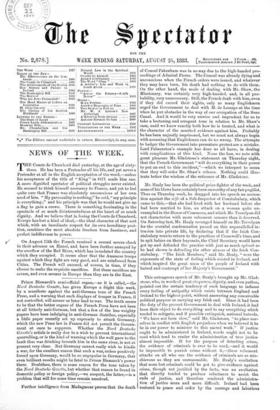This outrageous speech of Mr. Healy's brought up Mr. Glad-
stone, who, in words of great eloquence, dignity, and even pathos, pointed out the certain tendency of such language to inflame every feeling of antipathy which exists between England and Ireland to the highest point, without answering any conceivable political purpose or carrying any Irish end. Since it had been the duty of the present Government to deal with Ireland, it had been their object to do everything and to say everything which tended to mitigate, and if possible extinguish, national hatreds. " We have not been slow," said Mr. Gladstone, "to place our- selves in conflict with English prejudices when we believed it to be in our power to minister to this sacred work." If justice ought to be administered in Ireland, words ought not to be used which tend to render the administration of true justice almost impossible. If for the purpose of detecting crime, the evidence of criminals is ever to be used,—and it would be impossible to punish crime without it,—these vehement attacks on all who use the evidence of criminals are as mis- chievous as they are unreasonable. Mr. Healy's exultation that none but criminals could be got to give evidence against crime, though not justified by the facts, was an exultation that directly tended to produce reluctance to assist the ends of justice, and therefore rendered the administra- tion of justice more and more difficult. Ireland had been. restored to peace and order by the courage and laborious
efforts of a class of men whoe patriotism could hardly be exaggerated ; and even if they had made occasional slips in that difficult duty, they would be entitled to forbear- ance and reTect. Mr. Gladstone lamented these fierce and passionate diatribes, not because they hurt the Government, but because they retarded cr prevented the great work in Ireland for which the Government had so ea, nestly laboured. his own personal interest in this question could only be one of short dairation,—a remark cheered by Mr. Biggar, with his usual delicacy of feeling,—but if he were to speak for the last time in that House, he would use the language not of rebuke, but of appeal to honourable Members to question their own consciences whether they really thought it incumbent on them to use deliberately this inflamma- tory language, and so to retard as long as it was in their power, or even to prevent, the healing of the discords in the United Kingdom.



































